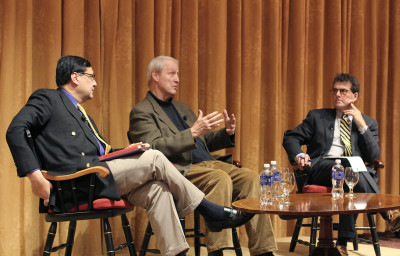
Hedrick Smith, a Pulitzer Prize-winning former New York Times reporter and Emmy Award-winning producer, spoke to Boston University students and faculty Tuesday about the “challenge” of Russian President Vladimir Putin.
“I ask the question — who is Putin?” Smith said. “Putin is a Russian czar. We need to understand Putin’s view of the world and the way he operates by understanding the way that Russian czars operate.”
In the BU Trustee Ballroom of the John and Kathryn Silber Administration Center, Smith informed a room of about 100 students and faculty about what he believed to be the unknown details of Putin, information that he said can help the United States read the foreign leader more easily. He described these details as “What you probably don’t know, but you need to know.”
“We have a lot of trouble reading Putin,” he said. “Putin is a very difficult guy to read, not only on your first reading but on your 15th reading.”
Smith expanded on this czar mentality and said Putin is largely concerned with expansion and power, emphasizing that “he has an advantage because he is willing to take the risk of using force.”
“Russian czars assume that countries right around the territory of Russia are the same to Russia as we assume in the Monroe Doctrine the Caribbean area is to us,” he said.
Smith said Putin’s role as a true Russian czar has shaped his interactions with other countries and foreign affairs.
“He is acting as a blocker of events, rather than a re-shaper,” Smith said. “He is acting as a blocker of the new Ukrainian government to exercise complete freedom. In Syria, he is blocking the defeat of [Syrian President Bashar al-Assad] in Syria. He is not actually able to impose. He is able to prevent.”
Efforts to deal with Putin must include “a sophisticated foreign policy,” Smith said. “ … You need to get tough in order to negotiate.”
Hope Kashatus, a senior in the Frederick S. Pardee School of Global Studies, said the speech addressed a number of important and time-sensitive issues.
“It was more in the wider scheme of historical context and kind of looking at broader solutions instead of immediate ramifications, which I think a lot of modern media kind of misses,” she said.
Sofya Bazhanova, a sophomore in the College of Arts and Sciences, said that as a Russian international student, she is looking at Putin in a different light.
“For my friends who are not Russian and not close to the Russian mentality, this was really clear and a good insight of what Russian people think about Putin.” she said. “Also the arguments presented about Putin being the new czar, I didn’t think about it before and I found them really interesting.”
Julianne Brown, a junior studying international relations in Pardee, said it was interesting to hear an outside perspective, after growing up abroad in Eastern Europe.
“I thought it was very interesting,” she said. “I grew up abroad in Romania, where there are fears of him expanding further than just Ukraine.”
Deniz Hallik, a freshman in CAS, said the U.S. government could take something from Smith’s words.
“[Smith] said what he would do right now was just get Putin in front of him and ask him what he wants,” she said. “That’s something that I think powerful countries like America should do with the Middle East or any problems around the world, and try to understand their perspective.”























































































































Lincoln Thompson • Nov 11, 2015 at 7:34 am
I can only assume that his Emmy Award is for fictional works. He informed a room of 100 about what he believed to be unknown details of Putin and made it quite clear that these details are still unknown to him.
Hendrick Smith states that Mr Putin blocked the NEW Ukrainian to exercise complete freedom, maybe he could enlighten us as to what happened to the legitimate government BEFORE the US led regime change. If he needs any assistance with that he could ask Victoria Nuland.
In Syria, Russia is there legally whereas the US is there illegally. The US is working with allies with edual agendas. Turkey are more concerned with bombing the Kurds than ISIS, the Saudis and Quataris are funding and arming ISIS while the US turns a blind eye because they are more concerned with an illegal regime change than ridding the region of ISIS.
Would Mr Smith tell his audience why NATO is still actively expanding after the Soviet Union has been disbanded and the Warsaw Pact is no more?